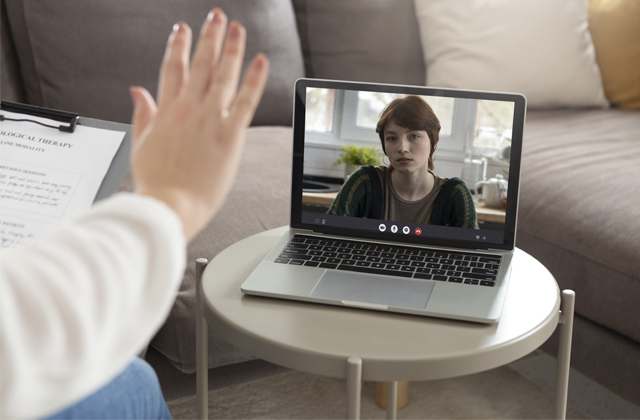Mental Health Considerations in the Digital Age: Online Therapy and Apps
In the digital age, technology has revolutionized many aspects of our lives, including how we manage our mental health. Online therapy and mental health apps have become increasingly popular, offering accessible and convenient ways to seek support. While these digital tools provide numerous benefits, they also come with unique considerations. This article explores the advantages and challenges of online therapy and mental health apps, providing insights into their effectiveness and practical tips for their use.

The Rise of Online Therapy
Accessibility and Convenience
One of the most significant benefits of online therapy is its accessibility. Traditional in-person therapy can be challenging to access due to geographical limitations, mobility issues, or busy schedules. Online therapy removes these barriers, allowing individuals to receive support from the comfort of their own homes. According to the American Psychological Association (APA), online therapy has made mental health services more accessible to people in remote areas and those with disabilities.
Flexibility and Convenience
Online therapy offers greater flexibility compared to traditional therapy. Sessions can often be scheduled outside of regular office hours, making it easier for individuals with busy schedules to find time for their mental health. Additionally, online platforms often provide various communication methods, such as video calls, phone calls, and messaging, allowing clients to choose the format that works best for them.
Cost-Effectiveness
Online therapy can be more cost-effective than in-person sessions. Without the need for physical office space, therapists can offer lower rates. Some online platforms also provide subscription models, offering access to therapy at a reduced cost. This can make mental health support more affordable for many people.
Effectiveness of Online Therapy
Research and Evidence
Research supports the effectiveness of online therapy for various mental health conditions. A study published in the *Journal of Anxiety Disorders* found that online cognitive-behavioral therapy is as effective as face-to-face CBT in treating anxiety and depression. The convenience and accessibility of online therapy can also lead to higher engagement and adherence to treatment plans.
Privacy and Anonymity
For some individuals, the anonymity provided by online therapy can make it easier to open up about sensitive issues. The comfort of being in a familiar environment can also reduce anxiety and make the therapeutic process more effective. However, it is essential to ensure that the online platform used is secure and maintains confidentiality.
Challenges of Online Therapy
Technology Barriers
Not everyone has access to the necessary technology or reliable internet connection to participate in online therapy. Technical difficulties can disrupt sessions and hinder the therapeutic process. Ensuring that both clients and therapists have the proper tools and technical support is crucial for the success of online therapy.
Lack of Physical Presence
The lack of physical presence in online therapy can be a drawback for some individuals. Non-verbal cues, such as body language and facial expressions, play a significant role in communication and can be harder to interpret through a screen. Some clients may feel that the therapeutic connection is weaker in an online setting.
Crisis Situations
Online therapy may not be suitable for individuals in crisis or those requiring immediate intervention. In-person therapy or emergency services might be necessary in such cases. It is essential for online therapists to have clear protocols for handling crises and ensuring clients’ safety.
The Role of Mental Health Apps
Self-Help and Monitoring Tools
Mental health apps offer a range of self-help tools and resources, from guided meditations and mood tracking to cognitive-behavioral exercises. These apps can complement therapy by providing users with additional support and techniques to manage their mental health. According to a study in JMIR Mental Health, mental health apps can effectively reduce symptoms of anxiety and depression.
Accessibility and Convenience
Mental health apps provide round-the-clock support, allowing users to access resources whenever they need them. This immediate availability can be particularly beneficial during times of stress or when traditional therapy is not accessible. Apps can also be used as a stepping stone for individuals who are hesitant to seek professional help.
Personalization and Engagement
Many mental health apps use artificial intelligence to personalize recommendations and track progress. This tailored approach can enhance user engagement and motivation. Regular reminders and interactive features can help users stay consistent with their mental health practices.
Considerations for Using Mental Health Apps
Evidence-Based Tools
It is crucial to choose mental health apps that are evidence-based and developed by reputable sources. Apps should be backed by scientific research and offer tools that have been proven effective in clinical studies. Users should look for apps with positive reviews from mental health professionals and users.
Privacy and Security
Privacy and security are paramount when using mental health apps. Users should ensure that the app complies with data protection regulations and has robust security measures in place to protect their personal information. Reading the app’s privacy policy and reviews can provide insights into its security practices.
Integration with Professional Support
While mental health apps can be valuable tools, they should not replace professional therapy. Apps are most effective when used as a supplement to professional support. Users should consider discussing their app usage with their therapist to ensure it aligns with their treatment plan.
Conclusion
In the digital age, online therapy and mental health apps offer accessible, convenient, and effective ways to support mental well-being. While they provide numerous benefits, it is essential to consider the challenges and limitations they may present. By choosing evidence-based tools, ensuring privacy and security, and integrating digital tools with professional support, individuals can effectively use technology to enhance their mental health. Embracing these digital resources can lead to a more comprehensive and accessible approach to mental health care.
